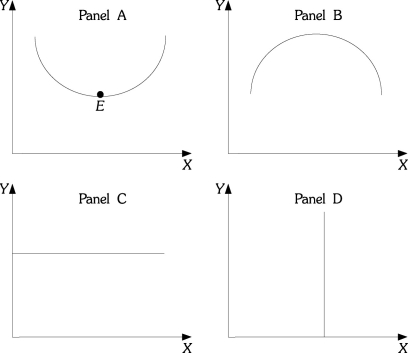A) decrease by 3.
B) decrease by 0.33.
C) increase by 3.
D) increase by 48.
Correct Answer

verified
Correct Answer
verified
Multiple Choice
At a political rally,you stand up to see better.Everyone else stands up,as well.This is an example of
A) ceteris paribus.
B) the post hoc,ergo propter hoc fallacy.
C) the fallacy of composition.
D) Ockham's razor.
Correct Answer

verified
Correct Answer
verified
True/False
Positive economics seeks to understand behavior,but not make judgments.
Correct Answer

verified
Correct Answer
verified
Multiple Choice
Refer to Scenario 1.1 below to answer the questions that follow. SCENARIO 1.1: An economist wants to understand the relationship between minimum wages and the level of teenage unemployment.The economist collects data on the values of the minimum wage and the levels of teenage unemployment over time.The economist concludes that a 1% increase in minimum wage causes a 0.2% increase in teenage unemployment.From this information he concludes that the minimum wage is harmful to teenagers and should be reduced or eliminated to increase employment among teenagers. -Refer to Scenario 1.1.The statement that a 1% increase in the minimum wage causes a 0.2% increase in teenage unemployment is an example of
A) the fallacy of composition.
B) normative economics.
C) positive economics.
D) Ockham's razor.
Correct Answer

verified
C
Correct Answer
verified
Multiple Choice
You have noticed that there is an increase in the number of homeless people in your city.At the same time you observe that there are also a number of vacant apartments.You believe that the government could reduce the number of homeless people if landlords were required to rent their apartments for less than they are currently charging.This policy recommendation would be motivated by concerns over
A) efficiency.
B) equity.
C) economic growth.
D) stability.
Correct Answer

verified
Correct Answer
verified
Multiple Choice
Refer to the information provided in Figure 1.4 below to answer the questions that follow.  Figure 1.4
-Refer to Figure 1.4.Which of the following curves or lines has a zero slope throughout?
Figure 1.4
-Refer to Figure 1.4.Which of the following curves or lines has a zero slope throughout?
A) A
B) B
C) C
D) D
Correct Answer

verified
Correct Answer
verified
Multiple Choice
If you eat at a sushi restaurant that charges $20 for its all you can eat sushi special,then the marginal cost of your 10th piece of sushi is
A) zero.
B) $2.
C) $200.
D) $2,000.
Correct Answer

verified
A
Correct Answer
verified
Multiple Choice
Among the fundamental concepts in economics are
A) opportunity cost.
B) marginalism.
C) efficient markets.
D) all of the above
Correct Answer

verified
Correct Answer
verified
Multiple Choice
The study of how benefits are determined for city employees would be considered
A) microeconomics.
B) macroeconomics.
C) descriptive economics.
D) institutional economics.
Correct Answer

verified
Correct Answer
verified
Multiple Choice
Which of the following is an example of a positive statement?
A) There should be no unemployment in an advanced industrial society.
B) Higher prices cause consumers to purchase less.
C) Consumption should be distributed fairly in society.
D) People should pollute as little as possible.
Correct Answer

verified
Correct Answer
verified
Multiple Choice
Which of the following is the best definition of economics?
A) the study of how individuals and societies choose to use the scarce resources that nature and previous generations have provided
B) the study of how consumers spend their income
C) the study of how business firms decide what inputs to hire and what outputs to produce
D) the study of how the federal government allocates tax dollars
Correct Answer

verified
Correct Answer
verified
Multiple Choice
The slope of a non-linear curve
A) is always positive.
B) must first increase then decrease.
C) is not constant.
D) is constant.
Correct Answer

verified
Correct Answer
verified
Multiple Choice
There is a possibility that a national sales tax will be implemented.Many economists argue that items such as food and clothing should be exempt from such a tax because low-income people spend a greater percentage of their income on these goods than do high-income individuals.This argument is motivated by concerns over
A) economic growth.
B) economic stability.
C) efficiency.
D) equity.
Correct Answer

verified
Correct Answer
verified
True/False
Resources are unlimited in a wealthy society.
Correct Answer

verified
Correct Answer
verified
Multiple Choice
Economists often refer to risk-free ventures as
A) efficient market outcomes.
B) profit opportunities.
C) those with no opportunity costs.
D) break-even propositions.
Correct Answer

verified
Correct Answer
verified
Multiple Choice
Which of the following statements is NOT correct?
A) Economics is a behavioral science.
B) In large measure,economics is the study of how people make choices.
C) If poverty were eliminated,there would be no reason to study economics.
D) Economic analysis can be used to explain how both individuals and societies make decisions.
Correct Answer

verified
Correct Answer
verified
Multiple Choice
The study of economics
A) is a very narrow endeavor.
B) is a way of analyzing decision-making processes caused by scarcity.
C) is concerned with proving that capitalism is better than socialism.
D) focuses on how a business should function.
Correct Answer

verified
Correct Answer
verified
Multiple Choice
To isolate the impact of one single factor,economists invoke the assumption of
A) inductive reasoning.
B) Ockham's razor.
C) ceteris paribus.
D) post hoc,ergo propter hoc.
Correct Answer

verified
Correct Answer
verified
Multiple Choice
If you can buy 9 DVDs for $126 or you could buy 10 DVDs for $130,then the marginal cost of the tenth DVD is:
A) $4.
B) $13.
C) $14.
D) $130.
Correct Answer

verified
A
Correct Answer
verified
Multiple Choice
Which of the following is NOT listed in the book as a reason to study economics?
A) to learn a way of thinking
B) to understand society
C) to be an informed citizen
D) to learn how to make lots of money
Correct Answer

verified
Correct Answer
verified
Showing 1 - 20 of 120
Related Exams